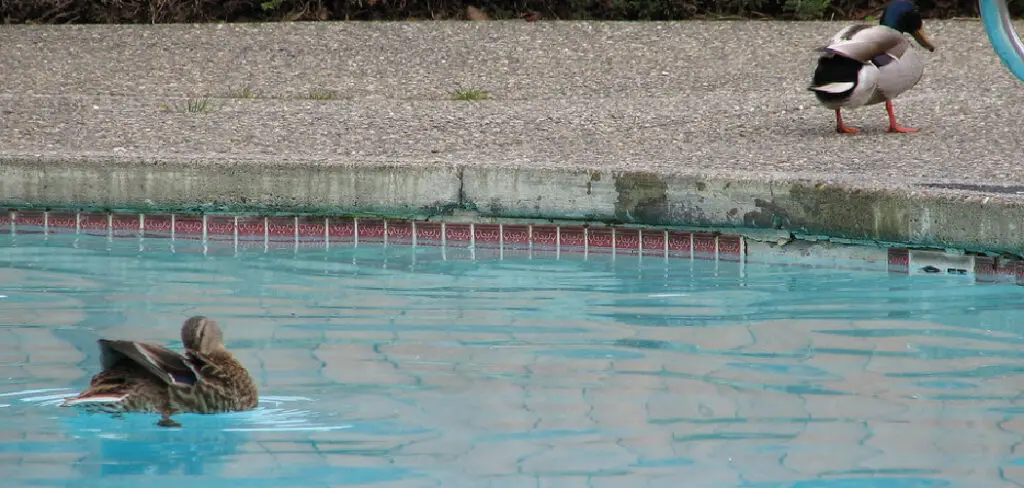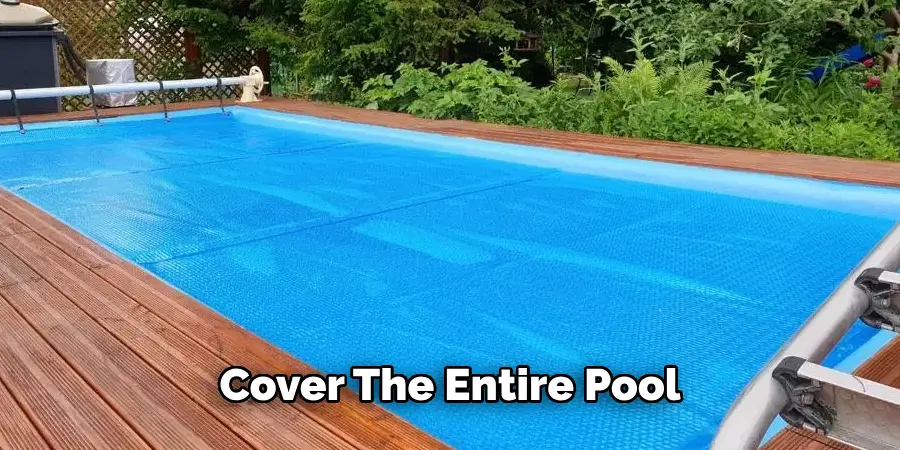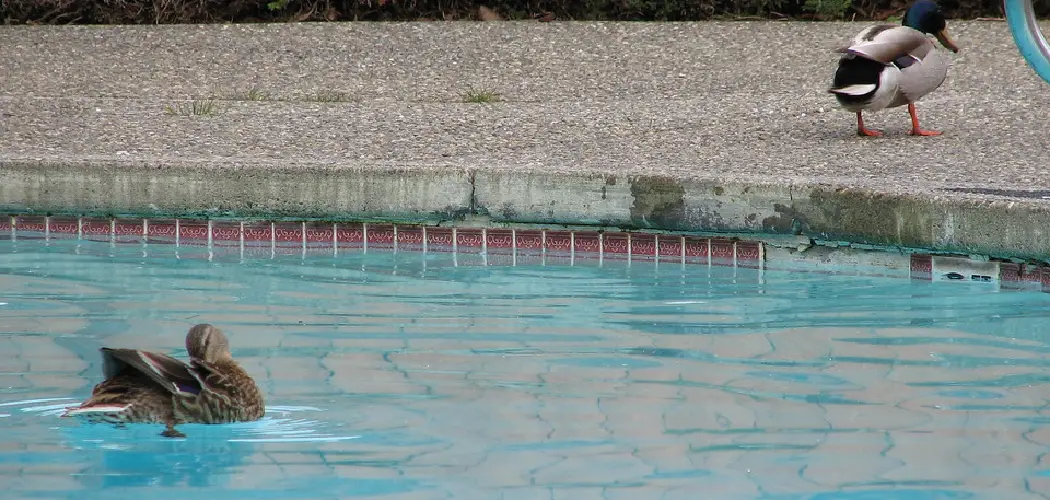Keeping ducks out of your pool at night can be a challenge, but with the right strategies, you can ensure a clean and safe swimming environment. This guide will explore effective methods for how to keep ducks out of pool at night, such as using pool covers, installing barriers, and employing natural deterrents. By implementing these practical tips, you can enjoy your pool without unwanted feathered visitors disrupting your swim or leaving behind messes.

Importance of Keeping Ducks Out of the Pool
Ensuring that ducks stay out of your pool is crucial for several reasons. Firstly, ducks can introduce bacteria and parasites into the water, posing health risks to swimmers. Their droppings can lead to the growth of harmful pathogens, making the pool unsafe for human use and requiring frequent and costly cleaning.
Secondly, ducks can cause damage to pool equipment and surfaces. Their claws and beaks can scratch and wear down pool liners or tiles, leading to maintenance issues over time. Additionally, ducks are known to be noisy, which can be a disturbance, especially during night-time hours.
Understanding the Attraction
To effectively keep ducks out of your pool, it is important to understand why they are attracted to it in the first place. Ducks are drawn to pools because they provide a safe and convenient water source for drinking, bathing, and staying cool, especially in warmer climates.
Pools also mimic the natural bodies of water that ducks inhabit in the wild, making them an inviting spot for resting and nesting. Additionally, the presence of food sources like insects, plants, or even leftover human food can further entice ducks to visit your pool area.
Types of Pool Covers Suitable for Deterring Ducks
There are several types of pool covers that can effectively deter ducks and other unwanted animals from accessing your pool. Each type offers distinct advantages and can be chosen based on your specific needs and preferences.
Solar Covers
Solar covers, also known as solar blankets, are designed to retain heat and reduce water evaporation. They float on the pool’s surface and can be an effective deterrent for ducks because they cover the entire pool, making it inaccessible. Additionally, solar covers can help maintain water temperature, making your pool more energy-efficient.

Mesh Covers
Mesh covers are another excellent option for keeping ducks out of the pool. These covers are made from strong, durable materials that allow rainwater to pass through while blocking debris and preventing animals from entering the pool. Mesh covers are easy to install and remove and are designed to withstand various weather conditions.
Solid Safety Covers
Solid safety covers provide a sturdy and impenetrable barrier over your pool. These covers are typically anchored around the pool’s perimeter, ensuring that no animals, including ducks, can gain access. Solid covers also keep out debris and sunlight, preventing algae growth and maintaining cleaner water.
10 Methods How to Keep Ducks Out of Pool at Night
1. Pool Covers
Using a pool cover is one of the most effective ways to keep ducks out of your pool at night. A sturdy pool cover creates a physical barrier that prevents ducks from accessing the water. Choose a cover that fits securely over your pool and is designed to withstand various weather conditions. Automatic pool covers are particularly convenient, as they can be easily deployed and retracted with the push of a button.
Ensure the cover is in place every evening before dusk to deter nocturnal visits from ducks. Regularly check the cover for any damages or gaps that ducks might exploit.
2. Floating Deterrents
Floating deterrents such as pool toys, inflatable animals, or even commercial duck repellents can create an uninviting environment for ducks. Ducks are cautious creatures and are likely to avoid areas where they perceive potential threats.
Place a variety of floating objects in your pool, ensuring they are evenly distributed. Inflatable alligators or snakes can be particularly effective as they mimic natural predators. Regularly move these objects around to prevent ducks from becoming accustomed to their presence. Floating solar lights can also add an extra layer of deterrence by illuminating the water surface at night.
3. Motion-Activated Sprinklers
Motion-activated sprinklers are an excellent way to keep ducks out of your pool at night. These devices detect movement and release a sudden burst of water when triggered, startling ducks and deterring them from landing. Position the sprinklers around the perimeter of your pool, focusing on areas where ducks are likely to approach.
Adjust the sensitivity settings to ensure the sprinklers activate only when ducks are nearby, minimizing false activations. Regularly test and maintain the sprinklers to ensure they function properly. The combination of movement, noise, and water makes this method highly effective.

4. Pool Fencing
Installing a fence around your pool can provide a robust physical barrier that prevents ducks from accessing the water. Choose a fence design that is at least four feet tall and has closely spaced vertical bars or mesh to prevent ducks from slipping through.
Ensure the fence gates are securely latched to maintain an uninterrupted barrier. Adding a pool gate alarm can provide an additional layer of security by alerting you to any breaches. Fencing not only keeps ducks out but also enhances the safety of your pool area for children and pets.
5. Reflective Objects
Reflective objects can disorient and deter ducks from approaching your pool. Hang reflective tape, old CDs, or small mirrors around the pool area. These objects create flashes of light that can confuse and scare ducks, especially at night when the reflections are more pronounced. Position the reflective objects at varying heights and angles to maximize their effectiveness.
Regularly move and adjust these objects to prevent ducks from becoming accustomed to them. Combining reflective objects with other deterrents can create a multi-sensory barrier that ducks are unlikely to penetrate.
6. Noise Makers
Using noise makers can create an auditory environment that is unpleasant for ducks, deterring them from your pool. Devices such as ultrasonic repellers, wind chimes, or motion-activated alarms can produce sounds that ducks find disturbing.
Ultrasonic repellers emit high-frequency sounds that are generally inaudible to humans but irritating to ducks. Motion-activated alarms can produce sudden, loud noises when ducks approach, startling them away. Wind chimes provide a more passive noise deterrent, with their constant, unpredictable sounds creating an unwelcoming atmosphere. Experiment with different noise makers to find the combination that works best for your situation.
7. Chemical Repellents
Chemical repellents specifically designed to deter birds can be applied around your pool area. These repellents are usually non-toxic and create an unpleasant taste or smell that discourages ducks from landing. Spray the repellent around the pool deck, along the pool edges, and on nearby surfaces where ducks might rest.
Follow the manufacturer’s instructions for application frequency and safety precautions. Regular reapplication may be necessary, especially after rain or cleaning. While chemical repellents provide a temporary solution, they are most effective when used in conjunction with other deterrents.

8. Laser Lights
Laser lights can be an effective and visually dynamic way to deter ducks from your pool. Ducks are naturally wary of sudden, bright lights, and the unpredictable patterns created by laser lights can scare them away.
Install outdoor laser lights around your pool area, ensuring they cover the water surface and surrounding deck. Set the lights to activate automatically at dusk and turn off at dawn. Regularly adjust the light patterns and angles to prevent ducks from becoming accustomed to them. Laser lights provide an added level of deterrence by creating a constantly changing and unsettling environment.
9. Habitat Modification
Modifying the surrounding habitat can make your pool area less attractive to ducks. Remove any food sources such as bird feeders or fruit-bearing plants that might attract ducks to your property.
Trim overhanging branches and vegetation that provide cover or perching spots for ducks. Installing barriers such as rocks or shrubs near the waterline can also discourage ducks from approaching. Consider adding a designated water feature or pond away from your pool to provide an alternative water source for the ducks.
10. Regular Maintenance and Monitoring
Regular maintenance and monitoring of your pool area are essential for keeping ducks away. Clean your pool and surrounding deck frequently to remove any debris or droppings that might attract ducks. Inspect your pool cover, fencing, and other deterrents regularly for any signs of wear or damage, and repair them promptly.
Install motion-activated cameras or wildlife cameras to monitor duck activity and identify any patterns or entry points. By staying vigilant and proactive, you can address potential issues before they become significant problems and ensure that your pool remains duck-free.

Conclusion
Each of these methods provides a unique approach to keeping ducks out of your pool at night. By combining several strategies, you can create a comprehensive and effective system to deter ducks and maintain a clean and safe pool environment.
Consistency and adaptability are key, as ducks can become accustomed to certain deterrents over time. Regularly assessing the effectiveness of your chosen methods and making necessary adjustments will help you achieve long-term success in keeping ducks out of your pool. Thanks for reading, and we hope this has given you some inspiration on how to keep ducks out of pool at night!
About
Outdoor Fixes is a distinguished figure in the world of Diy design, with a decade of expertise creating innovative and sustainable Diy solutions.
His professional focus lies in merging traditional craftsmanship with modern manufacturing techniques,
fostering designs that are both practical and environmentally conscious. As the author of diy,
outdoorfixes delves into the art and science of outdoorfixes-making, inspiring artisans and industry professionals alike.
Education RMIT University
(Melbourne, Australia) Associate Degree in Design (Outdoor Fixes) Focus on sustainable design, industry-driven projects,
and practical craftsmanship. Gained hands-on experience with traditional and digital manufacturing tools, such as CAD and CNC software.
Nottingham Trent University
(United Kingdom) Bachelor’s in outdoorfixes.com and Product Design (Honors) Specialized in product design with a focus on blending creativity with production
techniques. Participated in industry projects, working with companies like John Lewis and Vitsoe to gain real-world insights.
Publications and Impact
In diy, Outdoor Fixes his insights on indoor design processes, materials, and strategies for efficient production.
His writing bridges the gap between artisan knowledge and modern industry needs, making it a must-read for both budding designers and seasoned professionals.

